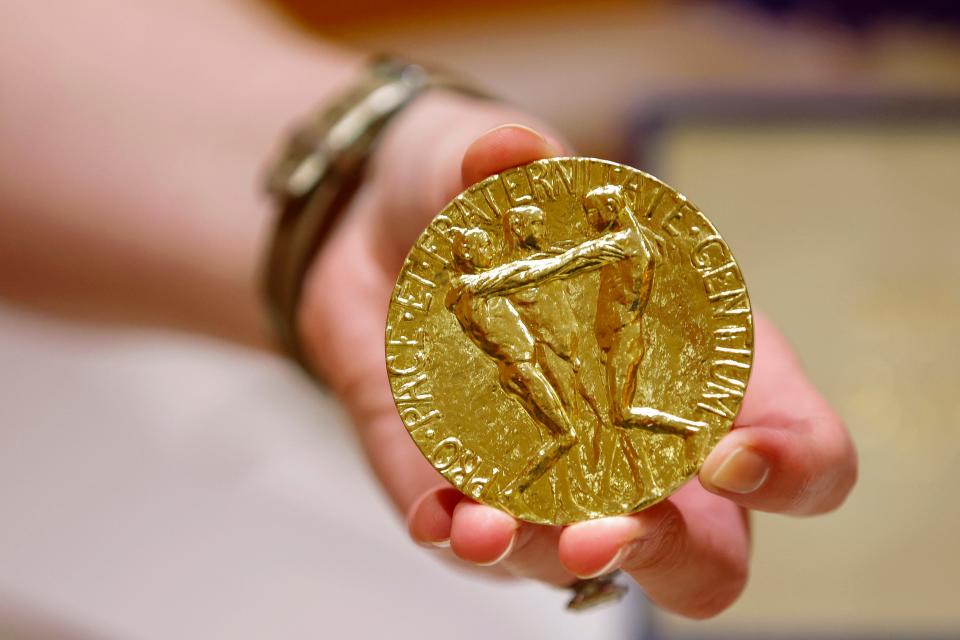How many Nobel Prizes are there? Categories, most decorated winners and other fast facts.
- Oops!Something went wrong.Please try again later.
The Nobel Prizes are awarded each year on Dec. 10, the anniversary of founder Alfred Nobel’s death. The announcement of the prestigious prizes comes much earlier, however, and this year’s installment is here.
Imprisoned Iranian human rights activist Narges Mohammadi won the 2023 Nobel Peace Prize. Mohammadi, who is currently serving a 10-year jail sentence on false charges of “spreading propaganda” is the fourth Nobel Prize winner jailed at the time of their awarding.
Here are other notable facts about the highly coveted honors.

How many Nobel Prizes are there?
There are six Nobel Prize categories up for grabs. Alfred Nobel, an inventor, entrepreneur, scientist, businessman and writer, outlined the original five prizes in his will in 1895. In 1968, Sweden’s central bank created a sixth prize, The Sveriges Riksbank Prize in Economic Sciences in Memory of Alfred Nobel.
Nobel Prize in physics
Nobel Prize in chemistry
Nobel Prize in physiology or medicine
Nobel Prize in literature
Nobel Peace Prize
The Sveriges Riksbank Prize in Economic Sciences in Memory of Alfred Nobel
Learn more: Here's how the Nobel Prizes came to be
Who won the 2023 Nobel Prize?
All categories were honored this year and announced in October 2023. Up to three people or institutions can split the award. Here's who won:
Nobel Prize in physics: Pierre Agostini, Ferenc Krausz and Anne L'Huillier “for experimental methods that generate attosecond pulses of light for the study of electron dynamics in matter”
Nobel Prize in chemistry: Moungi G. Bawendi, Louis E. Brus and Alexi I. Ekimov “for the discovery and synthesis of quantum dots”
Nobel Prize in physiology or medicine: Katalin Karikó and Drew Weissman “for their discoveries concerning nucleoside base modifications that enabled the development of effective mRNA vaccines against COVID-19”
Nobel Prize in literature: Jon Fosse “for his innovative plays and prose which give voice to the unsayable”
Nobel Peace Prize: Narges Mohammadi “for her fight against the oppression of women in Iran and her fight to promote human rights and freedom for all”
Nobel Prize in economic sciences: Claudia Goldin "for having advanced our understanding of women's labour market outcomes."
How many Nobel Prize winners are there in the world?
The Nobel Prizes, including the prize for Economic Sciences, have been awarded 621 times – 117 physics awards, 115 chemistry awards, 114 for medicine, 116 for literature, 104 for peace and 55 economic sciences awards.
There have been 965 individual Nobel Prize winners and 27 winning organizations in the history of the awards.
Has anyone won 2 Nobel Prizes?
Yes, though only one person has been awarded two unshared Nobel Prizes. Linus Pauling, an American chemist and anti-nuclear advocate, won the chemistry award in 1954 for his research on the nature of the chemical bond and the Peace Prize in 1962 “for his fight against the nuclear arms race between East and West.”
Four other individuals and two organizations are multi-prize winners. American physicist John Bardeen, who discovered the “transistor effect,” is the only person to have won the Nobel Prize in Physics twice in 1956 and 1972.
Scientist Marie Curie, whose work with radioactive elements led to cancer treatments and X-rays, is the only person to have won two different science categories. She was also the first woman to win a Nobel Prize. She won the physics prize in 1903 and the chemistry prize in 1911.
Frederick Sanger is another double Prize winner, having won the Nobel Prize for chemistry in 1958 and 1980. Sanger’s methods helped determine the complete amino acid sequence of insulin and the ordered sequence of DNA molecules. His work “laid the foundations of humanity’s ability to read and understand the genetic code,” Scientific American reported.
K. Barry Sharpless won the chemistry award twice, once in 2001 and again in 2022. The American chemist’s awards recognized his work on "chirally catalysed oxidation reactions" and, most recently, the development of click chemistry.
Two organizations have won multiple Nobel Prizes, both for the Nobel Peace Prize. The International Committee of the Red Cross has three – one from 1917 for care of wounded soldiers during World War I, in 1944 for its work in World War II and in 1963 for “promoting the principles of the Geneva Convention and cooperation with the UN.”
The Office of the United Nations High Commissioner for Refugees won the Peace Prize once in 1954 and again in 1981.
'Woman, life, liberty': Iran rights activist Narges Mohammadi wins 2023 Nobel Peace Prize
Just Curious for more? We've got you covered
USA TODAY is exploring the questions you and others ask every day. From "How long do cats live?" to "What did Albert Einstein invent?" to "How much creatine should I take?" − we're striving to find answers to the most common questions you ask every day. Head to our Just Curious section to see what else we can answer for you.
This article originally appeared on USA TODAY: How many Nobel Prizes are there? Categories, most decorated winners.

